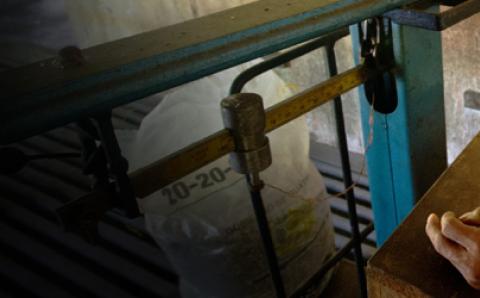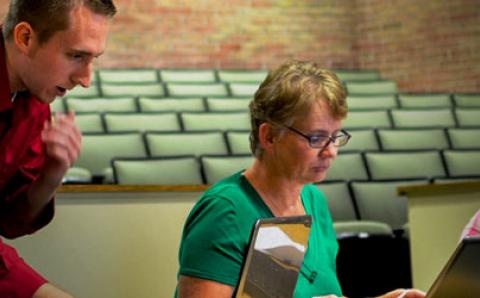I’d like to hazard a guess right here and now that the majority of you who have read the title to this article have already formed some pretty vivid impressions about what “simple living” means. It’s fair to say that for many it suggests some kind of bucolic scene, perhaps a bygone era not fit for the myriad challenges of the present day.
Maybe in your mind’s eye you see a family of homesteaders, Laura Ingalls Wilder style, feeding the woodstove so they can prepare a dinner from food planted, tended, and harvested by their own hands. There they are, gathered by the fire after dinner, piecework in their laps, a hushed silence descending as they mend, knit, and sew. Or maybe you’re thinking of your hippie neighbor who’s relentless about recycling and saving water and riding her bike and who sells the eggs produced by her backyard hens. There are many riffs on this theme, but I’m betting that “simple living” makes you think about a lifestyle that’s different from yours.
This is no cause for alarm, but it is cause for thought. You see, I’m convinced that living simply is the only way of living that leads to the kind of shalom most of us are so keenly seeking. For Christians, the injunction to live simply begins with the Scriptures, where God’s intent for our lives is woven through stories, letters, visions, and admonishments. Many writers have helped us think through the biblical requirements for us to tend and care for the whole of God’s creation (see “For Further Reading” for just a few of them).
So what does “living simply” entail? Here’s one phrase people have used to define simple living: I choose to live simply so that others might simply live. It sounds helpful, but what does that really mean? I believe that negotiating a fuller description of what belongs under the banner of simple living requires us to recognize this starting point: In North America, we’re part of a system of wealth creation and retention—consumer capitalism—that inherently degrades our own humanity as well as the humanity of other people, creatures, and environments around the world. Speaking coherently about what simple living entails means acknowledging our participation in this economic system and allowing it to alter our way of life.
Making these connections for ourselves and for one another is the most vital key to unlocking the puzzle of simple living. Until we’re willing to admit that our fraught, consumptive lifestyles are degrading life for other people all over the world, until we know it with our minds and feel it with our hearts, we will not care enough to change.
Where do we start? Let’s begin with where we find ourselves right here and now, living in a time and place that places great expectations on us every single day. We’re supposed to be wonderful bosses and coworkers, parents, friends, cooks, wives, children, neighbors, cleaners, party hosts, Facebook friends, and Tweeters. In short, society asks us to live disintegrated lives. Simple living, on the other hand, calls us toward integration and the call for shalom that is at the heart of God’s Word.
What’s for Dinner?
Simple living affects each and every corner of our lives. But to help us think more clearly and concisely about making the kinds of connections we need to make between our lifestyles and the creation, I want to place one particular aspect of our lives under the “simple living microscope.” We’re going to engage in a bit of careful thinking about dinner. That’s right—we’re going to consider the implications of putting dinner on the table.
That’s one of the more mundane aspects of our daily existence and therefore one we usually don’t endow with much consideration. But there are all sorts of ways of putting dinner on the table that can diminish the lives of other people and of the creation as a whole. We must become good at asking difficult, time-consuming questions about our food and about our habits of eating.
Let’s start by recognizing that the way we eat does affect the lives of other people. When, for example, we eat out of season, we are participating in the system of energy-intensive transportation that’s necessary to ship food from far away so we can eat what we want when we want it. When we shop with only price as our bottom line, buying foods simply because they are cheap, we’re ignoring the hidden costs that allow for such savings. The reason it’s cheaper to buy industrially produced foods from large manufacturers is precisely because they participate in practices that degrade the creation. If we want to be part of a food economy that does not diminish either people or the environment, we must be prepared to pay the real price. That requires an almost complete paradigm shift. For decades North Americans have seen the average household food expenditure as a percentage of all other expenditures fall lower and lower. When you find green beans at the grocery store for under a dollar a pound, you can safely assume that there’s a sinister reason for this, a reason that diminishes some other person and some other place.
But there’s good news too. There are ways we can experience God’s healing embrace for ourselves and for the whole of the creation as we gather food and prepare and consume it. It’s my belief that food we have prepared ourselves over time, food we have sourced responsibly and carefully, food that we share with our neighbors and friends connects us in some quietly profound ways with God.
Here’s how that might look. Perhaps one night a week you could choose to eat simply—say, beans and rice. With this act you stand in solidarity with those around the world whose only sustenance is beans and rice; it connects you to God’s people. Perhaps you could choose to eat meat for dinner only half the time, knowing that it takes more resources (animal feed and water) to grow meat than it does grains and vegetables. As a result, you will be more grateful for the meat you do eat. Or maybe you could plant just one of the foods you like to eat—say, kale or basil—and feel deeply connected to God as you tend, harvest, and eat that bounty. It’s also possible that none of these suggestions is right for you in your endeavor to live more simply. That’s part of the glorious diversity in God’s creation. If we ask the Lord to show us how to live more simply, he’ll do so.
Ultimately, I hope that we can see simple living as an invitation, not as a burden or a fad, not something only for the rurally inclined. The invitation to us today is to go back to those first thoughts we had about what simple living looks like and try, with grace for ourselves, to image our lives lived more simply for the glory of God—and then to begin.
For Further Reading
Steven Bouma-Prediger, For the Beauty of the Earth, Baker, 2001.
Doris Janzen Longacre, Living More with Less, 30th ed., Herald Press, 2010.
Walter Brueggemann, The Prophetic Imagination, 2nd ed., Fortress Press, 2001.
About the Author
Helen Aupperlee and her family live in Grand Rapids, Mich., where they work, grow vegetables, eat with neighbors and friends, and try to live more simple lives.







